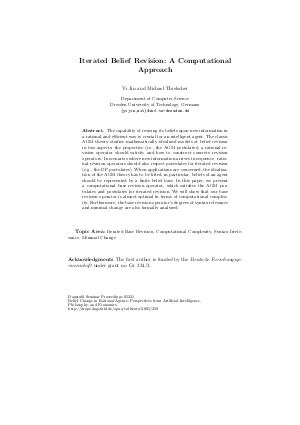Actions and Belief Revision : A Computational Approach
Authors Yi Jin, Michael Thielscher
-
Part of:
Volume:
Dagstuhl Seminar Proceedings, Volume 5321
Part of: Series: Dagstuhl Seminar Proceedings (DagSemProc) - License:
 Creative Commons Attribution 4.0 International license
Creative Commons Attribution 4.0 International license
- Publication Date: 2005-11-22
File

PDF
DagSemProc.05321.5.pdf
- Filesize: 276 kB
- 25 pages
Document Identifiers
Subject Classification
Keywords
- Iterated Belief Revision
- Belief Base Revision
- Computational Complexity
Metrics
- Access Statistics
-
Total Accesses (updated on a weekly basis)
0Document
0Metadata
Abstract
The classic AGM theory studies mathematically idealized models of belief revision in two aspects: the properties (i.e., the AGM postulates) a rational revision operator should satisfy; and how to mathematically construct concrete revision operators. In scenarios where new information arrives in sequence, rational revision operators should also respect postulates for iterated revision (e.g., the DP postulates). When applications are concerned, the idealization of the AGM theory has to be lifted, in particular, beliefs of an agent should be represented by a finite belief base. In this talk, we present a computational base revision operator, which satisfies the AGM postulates and some nice postulates for iterated revision. We will also give a formal assessment of the base revision operator in terms of its computational complexity and degree of syntax irrelevance.
Cite As Get BibTex
Yi Jin and Michael Thielscher. Actions and Belief Revision : A Computational Approach. In Belief Change in Rational Agents: Perspectives from Artificial Intelligence, Philosophy, and Economics. Dagstuhl Seminar Proceedings, Volume 5321, pp. 1-25, Schloss Dagstuhl – Leibniz-Zentrum für Informatik (2005)
https://doi.org/10.4230/DagSemProc.05321.5
BibTex
@InProceedings{jin_et_al:DagSemProc.05321.5,
author = {Jin, Yi and Thielscher, Michael},
title = {{Actions and Belief Revision : A Computational Approach}},
booktitle = {Belief Change in Rational Agents: Perspectives from Artificial Intelligence, Philosophy, and Economics},
pages = {1--25},
series = {Dagstuhl Seminar Proceedings (DagSemProc)},
ISSN = {1862-4405},
year = {2005},
volume = {5321},
editor = {James Delgrande and Jerome Lang and Hans Rott and Jean-Marc Tallon},
publisher = {Schloss Dagstuhl -- Leibniz-Zentrum f{\"u}r Informatik},
address = {Dagstuhl, Germany},
URL = {https://drops.dagstuhl.de/entities/document/10.4230/DagSemProc.05321.5},
URN = {urn:nbn:de:0030-drops-3599},
doi = {10.4230/DagSemProc.05321.5},
annote = {Keywords: Iterated Belief Revision, Belief Base Revision, Computational Complexity}
}
